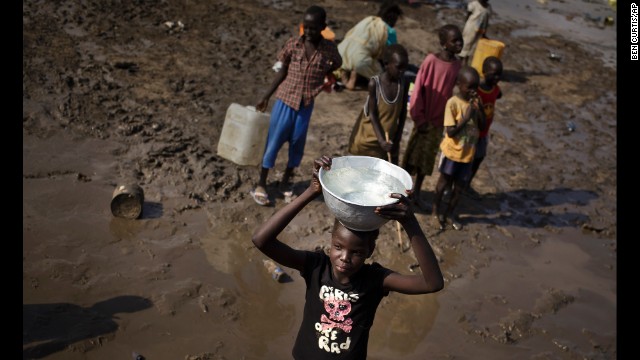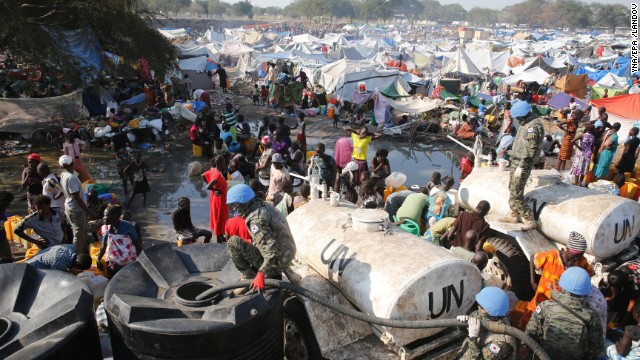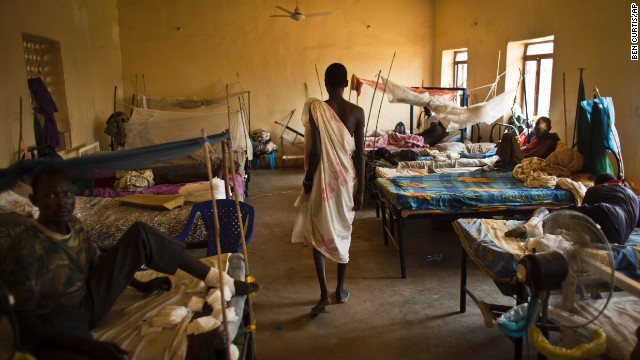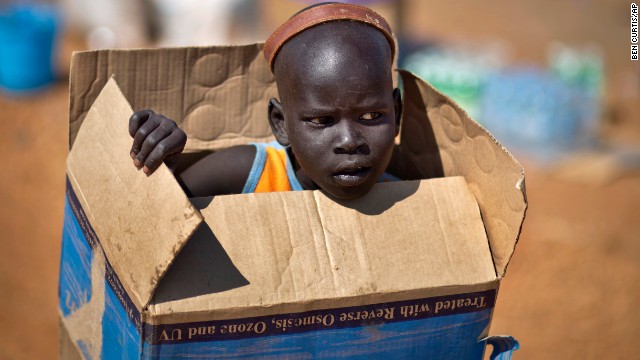 A girl carries a bowl of water
after filling it from a truck at a United Nations compound that has become home
to thousands of people displaced by recent fighting in Juba, South Sudan, on
Sunday, December 29. Clashes between rival groups of soldiers in Juba a week ago
have spread across the country.
A girl carries a bowl of water
after filling it from a truck at a United Nations compound that has become home
to thousands of people displaced by recent fighting in Juba, South Sudan, on
Sunday, December 29. Clashes between rival groups of soldiers in Juba a week ago
have spread across the country.
A man
walks in a ward where most patients are soldiers with gunshot wounds inside the
Juba Military Hospital in Juba on Saturday, December 28.
A
displaced boy carries a cardboard box inside a United Nations compound in Juba
on Friday, December 27.
African nations should have acted
quickly to help quell the bloody fighting that has consumed parts of South Sudan
this month, the President of the new country told CNN on Monday.
As soon as an attempted coup took
place and violence broke out, "the original leaders and all African leaders
should have come in with military support," so that the rebels would be "crushed
once and for all," President Salva Kiir said.
However, he said, he did not ask
them for help.
East African nations have set
Tuesday as a deadline for the two sides to engage in talks.
If the other side, led by former
South Sudanese Vice President Riek Machar, does not agree to talk, then "we will
fight," Kiir vowed. "In both cases," he said, peace "will be restored."
Ugandan President Yoweri
Museveni, at a news conference, said that if Machar does not agree to talks, the
other countries will "go for him." Asked what that means, he said, "defeat
him."
Machar could not be reached
immediately for comment.

Machar is a longtime rival of
Kiir. The men are from tribal clans. Kiir is from the Dinka tribe, Machar from
the Neur.
Kiir accused Machar of trying to
stage a coup. Machar has denied the claim.
Fighting broke out on December
15 in the capital city of Juba. It quickly spread across the country, with
reports of mass killings that were lent credence by mass graves.
Militia persuaded to
retreat
Government officials have
persuaded an ethnic militia loyal to Machar to retreat from Bor, Rachel Nyedak
Paul, the deputy information minister in Juba, told CNN on Monday.
An estimated 20,000 ethnic Nuer
from the so-called White Army had been headed for the city, raising fears of
more violence.
Paul told CNN that she and other
officials who are Nuer and originally from the North Jonglei province -- the
same area where the White Army originated -- had a series of phone conversations
with leaders of White Army on Monday.
They told the leaders the
current crisis was a political and not a tribal battle and told them to not get
involved.
The youths in the White Army are
known for the white powder they use to cover their skin as an insect
repellant.
 A man
walks in a ward where most patients are soldiers with gunshot wounds inside the
Juba Military Hospital in Juba on Saturday, December 28.
A man
walks in a ward where most patients are soldiers with gunshot wounds inside the
Juba Military Hospital in Juba on Saturday, December 28.
 A
displaced boy carries a cardboard box inside a United Nations compound in Juba
on Friday, December 27.
African nations should have acted
quickly to help quell the bloody fighting that has consumed parts of South Sudan
this month, the President of the new country told CNN on Monday.
A
displaced boy carries a cardboard box inside a United Nations compound in Juba
on Friday, December 27.
African nations should have acted
quickly to help quell the bloody fighting that has consumed parts of South Sudan
this month, the President of the new country told CNN on Monday.
No comments:
Post a Comment